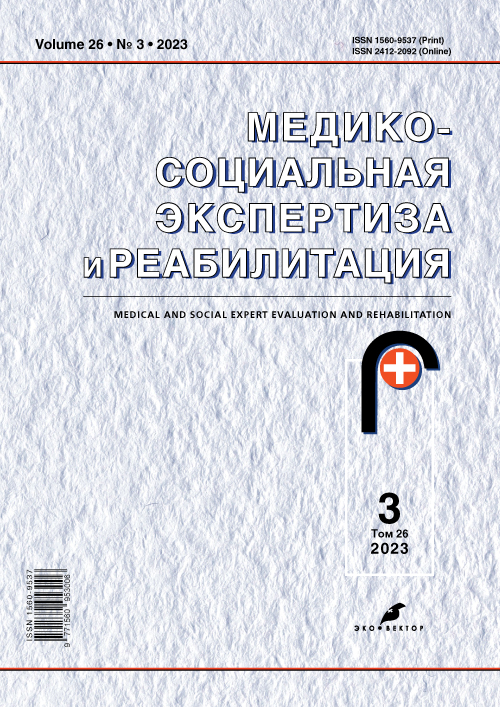Clinical and neurological aspects of endocrine disorders in Down syndrome in children
- Authors: Kolcheva J.A.1, Adrianov A.V.1
-
Affiliations:
- Institute of Additional Professional Education FSBI «Federal Scientific Research Center for Medical and Social Expertise and Rehabilitation named after G.A. Albrecht»
- Issue: Vol 26, No 3 (2023)
- Pages: 165-172
- Section: Original study articles
- URL: https://rjmseer.com/1560-9537/article/view/624525
- DOI: https://doi.org/10.17816/MSER624525
- ID: 624525
Cite item
Abstract
BACKGROUND: Down syndrome is a common genetic pathology in which multiple defects are observed, including endocrine disorders of varying severity. Hypothyroidism occupies a leading position among all hormonal disorders in such children. However, the significance of hypofunction of the thyroid gland in the development and progression of cerebral dysfunction in children with trisomy 21 has not been sufficiently studied.
AIM: Assessment of the impact of endocrine pathology in children with Down syndrome on the state of neurological functions.
MATERIALS AND METHODS: We examined 50 children aged 3–5 years with complete trisomy of chromosome 21. At the same time, the number of boys was 13 (32%), girls — 27 (68%). Children of the main group had verified endocrine disorders associated with Down syndrome. Children in the control group had a confirmed diagnosis of Down syndrome, but did not have endocrine pathology, and their number was 10 people — 8 girls (80%) and 2 boys (20). Everyone underwent speech therapy and neuropsychological examination. Children of the main and control groups, in addition to standard biochemical and general blood tests, underwent a detailed laboratory study with determination of T3, T4, TSH levels. An advisory examination and dynamic observation by a speech therapist for 6 months. All children were assessed by a neurologist according to generally accepted methods.
RESULTS: Data have been obtained indicating a fairly widespread prevalence of thyroid dysfunction among patients with Down syndrome. However, clinical symptoms may not be specific due to their similarity to the phenotypic manifestations of a genetic disease. Thus, patients with clinically significant hypothyroidism had more severe cognitive impairment. There was a significantly lower level of psycho-speech development in 95.3±3.1% of cases (p <0.001) according to the results of comprehensive neuropsychological and speech therapy examinations. In the group of children with severe hypothyroidism, significantly more severe disorders of mental functions were encountered. At the same time, as thyroxine was prescribed in age-appropriate dosages for 3 months, the child’s condition improved, mnestic functions and voluntary attention improved in 60% of patients in the main group. In 70% of cases, there was an improvement in the evacuation function of the gastrointestinal tract, in 65% there was a normalization of the humidity and temperature of the skin.
CONCLUSION: Timely diagnosis of thyroid gland dysfunction is an important preventive measure for genetic abnormalities associated with multiple comorbid pathologies, such as trisomy 21, Down syndrome. Timely correction of existing disorders can improve the quality of life of such children and their relatives and can contribute to their adequate socialization and adaptation in modern society.
Full Text
About the authors
Julia A. Kolcheva
Institute of Additional Professional Education FSBI «Federal Scientific Research Center for Medical and Social Expertise and Rehabilitation named after G.A. Albrecht»
Author for correspondence.
Email: j.kolcheva@mail.ru
ORCID iD: 0000-0003-0250-5478
SPIN-code: 3714-9162
ResearcherId: S-6356-2016
MD, Cand. Sci. (Med.), assistant professor
Russian Federation, 11/12 Bolshoy Sampsoniyevskiy pr., 194044 Saint-PetersburgAndrey V. Adrianov
Institute of Additional Professional Education FSBI «Federal Scientific Research Center for Medical and Social Expertise and Rehabilitation named after G.A. Albrecht»
Email: adrianov-av@mail.ru
ORCID iD: 0000-0001-8974-1160
SPIN-code: 1522-0539
MD, Dr. Sci. (Med.), assistant professor
Russian Federation, 11/12 Bolshoy Sampsoniyevskiy pr., 194044 Saint-PetersburgReferences
- Barashnev JuI. Down Syndrome. Medical genetic and socio-psychological portrait. Moscow: Triada-Х; 2007. (in Russ). Available from: https://rusneb.ru/catalog/000200_000018_RU_NLR_bibl_1057073/. Accessed: 08.03.2022.
- Malygina VI, Vikulova NN, Malygin VD, Vodjanikova AO. Complex rehabilitation of children of younger school age with Down syndrome. Nauchnyj vestnik Kryma. 2020;1(24):1–6. (in Russ). Available from: https://www.nvk-journal.ru/index.php/NVK/article/view/539/746. Accessed: 08.03.2022.
- Fenoll R, Pujol J, Esteba-Castillo S, de Sola S, Ribas-Vidal N, García-Alba J, et al. Anomalous White Matter Structure and the Effect of Age in Down Syndrome Patients. J Alzheimers Dis. 2017;57(1):61–70. Available from: https://www.j-alz.com. Accessed: 08.03.2022. doi: 10.3233/JAD-161112
- Chen MH, Chen SJ, Su LY, Yang W. Thyroid dysfunction in patients with Down syndrome. Acta Paediatrica Taiwanica. 2007;48(4):191–195.
- Mys Е‚ Ek-Prucnal M, Sadowska L, Gruna-Ozarowska A. The diagnostics and developmental stimulation of small children with 21 trisomy in compliance with thyroid function. Pediatric Endocrinology, Diabetes, and Metabolism. 2008;14(4):243–7.
- Volkova LS, Shahovskaja SN. Logopedia. Moscow: Vlados; 2002. (in Russ). Available from: https://www.elibrary.ru/item.asp?id=20027329. Accessed: 08.03.2022.
- Gibson PA, Newton RW, Selby K, et al. Longitudinal study of thyroid function in Down’s syndrome in the first two decades. Arch Dis Child. 2005;90(6):574–8. doi: 10.1136/adc.2004.049536
- Unachak K, Tanpaiboon P, Yupada Pongprot Y, et al. Thyroid functions in children with Down’s syndrome. J Med Assoc Thai. 2008;91(1):56–61.
- Chubarova AI, Semenova NA, Rumyantseva VA. Thyroid disease in children with Down syndrome. Sindrom Dauna. XXI vek. 2010;1(4):9–12. (in Russ).
- Chubarova AI, Semenova NA, Katyukhina AV. Medical supervision for a child with Down syndrome. Experience of foreign countries. Sindrom Dauna. XXI vek. 2010;2(5):11–3 (in Russ).
Supplementary files







